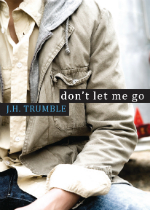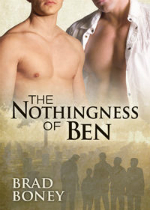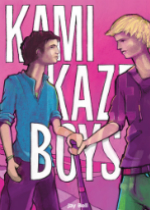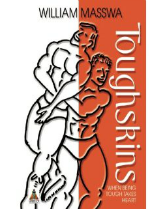And the Winner is…
Author: Dick Smart
May 27, 2013
Envy the judges who were privileged to weigh the merits of the five finalists in Gay Romance for the 25th Annual Lambda Literary Awards, but pity them, too, because they can only pick one winner, a task I would personally find impossible to do. The reader of any of these outstanding gay romances will be the real winner.
Don’t Let This Book Go
Don’t Let Me Go by J. H. Trumble (Kensington Books, 2012) reads like an extended “Glee”
episode, but one of the really good early ones. The author even provides a convenient soundtrack for the novel here. When Texas high schooler Nate Schaper’s boyfriend Adam Jefferies graduates and decides to take a chance as an off-Broadway actor, Nate insists he goes, even while inside, his heart is begging Adam to stay. The two part at the airport to “Free Bird” by Lynyrd Skynyrd and Nate makes one of the first of many gestures that endears him to the reader:
In the parking garage I turned the ignition key, ejected the CD, leaned it on a pencil behind my left back tire, and backed over it. My hero was gone.
On his own again, Nate defiantly launches an in-your-face queer blog and is militantly out at school because he refuses to back down in the face of blatant homophobia and physical attacks (think Kurt on Glee). When sympathetic school counselor, Mr. Wolf (in sheep’s clothing), advises Nate to “cool it with the gay,” Nate’s response burns on the page:
“Cool it with the gay?” I laughed. “I spent two and a half years at this school scared to death that someone would find out about me, terrified what that would mean. Do you have any idea how that feels? Do you? But I’m not that same kid anymore. And it doesn’t surprise me one bit that you’re not willing to stand up to the bigots and the other small minds in this community. You never have. But I will. There are other kids like me out there. And until they feel safe being who they are, then I’ll gladly take one for the team, flaunt it as you so eloquently put it last year.”
Nate finds a strange ally in straight Pakistani hunk and social media whiz, Daniel, whose older gay brother was kicked out by his family. Also along for the ride is Adam’s ex-girlfriend wannabe, Juliet, and young sophomore, Luke, who looks up to Nate as a gay role-model and more. Meanwhile, via Skype Nate keeps getting unwelcome glimpses of Adam’s shirtless roommate flirting with his boyfriend and begins to think that perhaps Luke’s puppy love is the real thing.
The plot itself is stock romance: inseparable lovers separated with all the attendant romantic misunderstandings, jealousies and mismatches. I’m normally allergic to teen coming out novels, but Trumble avoids the clichés while retaining the heartrending truths. One of which is the idea that we don’t just come out once, but have to continually come out throughout our lives. Trumble’s non-linear plot creates suspense by moving backwards to reveal the impact of the past in the present. Nate and Adam’s first kiss is worth the price of admission. Don’t let this book go without reading it.
Kensington released Trumble’s second novel, Where You Are, in December of last year. Find it here.
“Who can believe in the nothingness of Ben?”
Brad Boney’s The Nothingness of Ben (Dreamspinner Press, 2012) is a delightful “gay for you” romance, a sub-genre perfectly defined by our very flawed romantic hero, Ben Walsh, for the erstwhile straight mechanic, Travis Atwood:
“I know there are supposed to be these straight guys out there who go gay for that one special dude. But it’s a fantasy. It doesn’t really happen, except maybe in romance novels and gay porn.”
Except Boney makes it perfectly believable when the not-just-straight-acting and appearing but really straight East Texas mechanic Travis falls for New York City lawyer Ben Walsh, returned home to Texas upon the death of his parents.
At the funeral, Ben meets Travis, a single mechanic who lives across from the family home and who has been adopted as a big brother by Ben’s minor brothers—Quentin, Jason and Cade. Travis tells Ben, “I’m used to thinking of your brothers as the three musketeers. But you’re like the missing fourth musketeer. What happened, anyway?” Ben explains to an unsympathetic Travis that his relationship with his father was less than close:
“My father always seemed to give the best part of himself to his students…It would have been nice if he had taken me under his wing like that once in a while.” Travis responds honestly, “Doubt you needed it…Look at you. You’re Mr. Successful. Big hotshot lawyer from New York City. I reckon your dad did everything right.”
The need for a father moves the novel forward, but when it comes to parenting his own brothers, Ben admits, “I’m a terrible Plan B.” Travis steps in to help co-parent and bring the Walsh household back into order. Soon enough Ben discovers he’s falling for the rough-edged mechanic and Travis becomes like a red-headed step-father to the four dark-haired Walsh brothers.
But when Ben’s wealthy New York law partner and best friend, Colin, shows up with Ben’s big city boyfriend, David, Ben shows an unflattering snobbery. He admits to Travis, “I don’t really fit into Colin’s world, but I can certainly act like a dick trying.” Colin likens Travis to Scudder in Forster’s Maurice and Ben is faced with the choice of going back to the falsity of his life in the city versus moving forward to become the man he truly is with the rustic Travis.
What makes Travis’ love for Ben so believable and heart-breaking is that he is in love with the Walsh family, not just with Ben. Both men are fathers to each other and to the young Walsh brothers:
“I fell in love with you, Ben. I was walking in tall cotton. I finally had a real family. Someone was gonna love me and take care of me and let me love them back. If being gay was gonna bring me all that, then damn if it wasn’t the best thing that ever happened to me.”
Boney faults his writing style as “dialogue and stage directions,” but I call that bringing real people to life on the page. The three younger Walsh brothers are full characters in their own right who add to the credibility of our romantic heroes commitment.
Boney, perhaps tongue in cheek, makes it sound as if Ben is forced to choose between the Big City or Hicksville, but as he points out on his website, Austin is the 7th gayest city in America and sits in the middle of one of the nation’s biggest metro regions, so city slicker Ben won’t suffer too much. For pictures of Austin’s named places from the novel and to find out about Boney’s new novel, The Return, due out in July, go here. Follow the fictional young Walsh brothers on Twitter @Thr3eAmigos. You can listen to the novel’s eclectic playlist on You Tube.
Into the Woods
Kamikaze Boys by Jay Bell (Jay Bell Books, 2012) is an amazing story of two gay boys who fight back against the insanity of the heterosexual world around them. David Henry is an average gay high school boy in Kansas. “High school was vicious, as David—the lowest on the food chain—knew all too well.”
David didn’t know why people hated him. Faggot and gay were fairly general insults, but with him, people seemed to mean it. He wasn’t particularly feminine, hadn’t been caught doing something with another guy, but people assumed he was gay anyway.
He is terrorized daily by the school bully, Chuck Bryl. “If only his dad knew what he went through every day, but David couldn’t imagine them discussing it.” His father doesn’t talk to David, but treats him like “a problem that needed to be solved.”
Then one day while David is undergoing his usual afterschool humiliation at Chuck’s hands, school “bad boy,” Connor Williams, rescues him. Connor has a scar from jaw to Adam’s apple and rumor has it that he spent a year in juvenile hall for trying to kill his father. Handsome and well-built, he has a crazed look in his green eyes. David is as frightened of Connor as he is of Chuck, so when Connor offers him a lift home in his gunmetal gray 1968 Chevy Chevelle, David feels stuck between a rock and a hard place. Connor has had his eye on David, but not in the way David fears and their first conversation is at very comical cross-purposes because all “bad boy” Connor wants is to be able to hang out with David. Of course, David doesn’t have a clue because “Connor could walk right up to someone and announce he was gay, like he had done with Chuck, and no one would believe him.”
Their odd fellow friendship (“the guy who had done terrible things, and the guy who hadn’t done much of anything”) deepens into love, and Connor begins to sneak into David’s room through the window at night after his shift at McDonald’s. Here Bell evokes the famous scene from Forster’s Maurice, where the woodsman, Scudder, comes through the window to Maurice. Later the two boys play hookie from school and go make love in the woods, again evoking the woodsman theme from Maurice and the naturalness of gay love.
They didn’t belong here. He would rather be outside, running through the woods like the lost boys they were.
The scene becomes like a fairytale:
They went far enough into the woods that David wondered if they would find their way back again.
Or Peter Pan:
They could live out here forever, escaping the wishes of their parents and making a home in the wilderness, like a gay version of Robinson Crusoe.
Later when the two take a road trip and visit Connor’s dyke sister in Florida, Bell introduces the idea of the road as an escape from the oppressive heterosexual world that surrounds them back in Kansas:
“It feels so free out here on the road with you. We’ve got music, snacks in the back, and anything else we need is just a short stop away. It’s perfect. Let’s just keep driving forever.”
Meanwhile, steeled by Connor, David isn’t taking it anymore from Chuck, and he follows Connor in a series of pushbacks that culminate in a vicious attack on David by Chuck. David taunts his attacker:
“Are you going to keep chasing me around like a crush-obsessed girl!” He saw it then, the vulnerability on Chuck’s face…Chuck was gay. And was afraid to admit it. He was just a big, stupid, self-hating homosexual. Like a boy pulling a girl’s pigtails, he had taken every opportunity to interact with David, even if bullying was the best his addled brain could come up with. “It’s okay,” David started to say.
Connor reacts violently to Chuck’s attack on David, but guess who ends up in jail? David, in turn, vandalizes Chuck’s Mazda, but as a minor he is released to his father’s custody. Given the heretofore mild-mannered David’s sudden violent swing and his earlier pledge to skip a Stanford scholarship to run off with Connor to Florida upon graduation from high school, his father’s advice that the two should spend some time apart from each other to give David a chance to refocus on his goals, makes sense from a parent’s point of view, “Your life hasn’t even begun, and since you met that boy, you’ve been doing everything in your power to ruin it.”
But then David’s father tricks him into being hospitalized in “Gulfwood” under the care of Dr. Wolf (another Wolf in sheep’s clothing) and the cuckoo’s nest reveals the insanity of the heterosexual world that has turned Chuck into a street thug, driven Connor to a fit of rage and threatens to drug David into sexual compliance. Even though David is of the age of consent in Kansas, Dr. Wolf threatens to bring charges of corrupting a minor against Connor, if David doesn’t cooperate in his treatment. The doctor tries to get David to admit to “A list of everything that could be wrong with a person, and loving someone of the same sex was included.” This kind of recriminalization of gay love happens every day to young gay people in this country and we remain silent. Perhaps Bell, writing from Germany, can more clearly see the insanity of American Puritanism.
Lest I have made the novel sound too grim, trust me that the love between David and Connor is sweetly passionate. Bell also provides ample comic relief in David’s straight gamer friend, Gordon, and through the wily plots of his fellow Gulfwood inmates. How our two young gay heroes find their way out of this mess through sheer pluck makes for a gripping late night page-turner. Bell’s work reminds me of some of my favorite books by classic YA writer Paul Zindel.
I have argued before in this column that gay romance is a transgressive literature and in the hands of a powerful writer like Bell, this story of young gay love is a radical tale of liberation. The cool cover by Jay Bell’s partner, Andreas Bell, perfectly captures the radical idea of gay people fighting back, as well as the novel’s haunting theme of the road as a journey to freedom. I can’t imagine that any gay romance reader hasn’t already gobbled up Bell’s “Something Like…” romance series. Something Like Summer, is now available as an audiobook at Audible and in iTunes. Something Like Autumn is due out soon. For other Jay Bell books and his partner Andreas’ cool artwork, check out http://www.jaybellbooks.com/.
Celestial Love
The courage of gay love is not limited to contemporary bad boys. Barry Brennessel’s The Celestial (ManLoverPress, 2012) takes us to the dwindling gold camps of post-Civil War California where 19-year-old Todd Webster Morgan is trying to eke out his fortune from a small claim. Caught up in a camp feud among a band of Irish miners, Todd barely escapes with his life and little else when a young Chinese (a Celestial) immigrant named Lao Jian rescues him.
Brennessel’s handling of the growing love between Todd and Lao Jian is a good example of how to avoid having historical characters express the embarrassing racial prejudices of their time without imposing an anachronistic and wooden cultural correctness. Lao Jian tells Todd, “White men call me John-John. I’ll answer to that, if you find it easier.” But Todd remembers his “Uncle Ned calling some vegetable peddlers ‘China John,’ and not in an endearing way. I was sure by these men calling him ‘John-John’ it was for the same effect.” Todd’s mere human decency, which I suppose even a few gold miners might have exhibited, as well as Lao Jian’s bravery and pride are sufficient explanations for Todd’s respect. The two men stand up for each other against the prejudices and dangers surrounding them throughout the novel.
When the Chinatown in Truckee catches fire under suspicious circumstances and is left to burn by the indifferent white townspeople, Lao Jian escapes from the flames and shows Todd how to jump a freight train bound for Sacramento. There follows a romantic love scene in a clanging freight car—my favorite place for men to make love. In Sacramento white hooligans jump Lao Jian and his queue is cut off, Todd stays by his side to nurse his wounds and earns the respect of the Chinese community. Todd’s mother owns a small fruit orchard and when Lao Jian recovers he puts his horticultural gifts to good use and earns Todd’s family’s regard. The two men build together a life and a prosperous nursery business that we follow into the new century. The epilogue contains a fascinating historical detail about how Chinese immigrants were able to gain their citizenship after the San Francisco earthquake.
Two of Brennessel’s books were nominated for this year’s Lammys: Reunion, which I reviewed in August 2012’s Book Lovers column, and The Celestial. It is interesting that the Lambda judges passed over the richly literary Reunion in favor of The Celestial. I think it may be because The Celestial satisfies more as a forthright historical romance without the experimental detours that made Reunion so exciting. The rich historical detail of early California life and the tender love story of our two gay pioneers in The Celestial make it an easy choice as a Lambda finalist for Gay Romance.
The book’s cover by Winterheart Designs artfully captures the feel of an early daguerreotype photo. Fortunately for us readers there is more Brennessel to love here.
A Wrestling Match is a Wrestling Match is a Wrestling Match
Toughskins is the title of William Masswa’s novel of gay romance in the pro-wrestling circuit (Bold Strokes Books, 2012). The graceful line drawing of two wrestlers on the book’s cover is by Sheri. The novel’s romantic heroes, blonde, smooth John and red-headed, slightly furry Bret, have tough skins of muscle covering fragile personalities and wounded emotions. John has fought his way up through foster homes. The one foster Dad John really loves takes advantage of his need for a father to emotionally and physically abuse him before kicking him out. John finds his way to a pro-wrestling school and learns the ropes.
Masswa also knows the ropes of the pro-wrestling world and he opens up that world and its posturing to the reader with a look that is never condescending. The wrestlers and their managers and promoters are upfront about the showmanship trumping the sportsmanship. Russ, the head of the wrestling school, explains to John:
“A jobber is the clean-cut guy. The rule follower. He’s the good guy, the one who gets his ass handed to him by the guy known as the heel. The heel is usually bigger, older, and meaner.”
Mike, John’s coach, elaborates:
“It’s classic good guy versus bad guy. The greater the tension between the two, the greater the story.”
The story between the wrestlers is more exciting than the stock choreography of carnage. When John and Bret meet in the locker room for the first time just prior to being thrust into the ring together, it is heat at first sight:
John stares at Bret’s tight, bare stomach. Bret focuses on the hole in John’s jeans, but neither moves. Each stand as beefier versions of Michelangelo’s David: muscle as hard as marble, no known heart.
Although Lyle, their manager, has made it clear that Bret is to be the jobber, the good guy who loses, since he and John haven’t practiced together or rehearsed the fight, Bret decides he wants to take John down hard. “It’s time for him, finally time for him, to get what he wants. To get what he wants. But what he wants—is love.” The ensuring bout is all about raw physical hunger and exposed emotions. Masswa choreographs the fight scene in such vivid detail that the reader can picture every belly to belly and crotch to crotch hold. It is all too real and the crowd goes wild and two new wrestling stars are born. But once out of the ring, the two can’t find their emotional hold on each other and there follows a series of increasingly frustrating emotional feints.
The two can’t keep off each other in the ring, but can’t come together out of it. Masswa creates a powerful metaphor for John and Bret’s relationship as one big pro-wrestling match with all its posturing. Masswa drives the reader crazy building up excitement for the final big emotional smack down between John and Bret. In the novel’s satisfying conclusion, the two finally discover how to heal their raw emotions in a physical connection outside of the ring.
These are the five finalists in Gay Romance for the 25th Annual Lambda Literary Awards. And the envelope, please….






